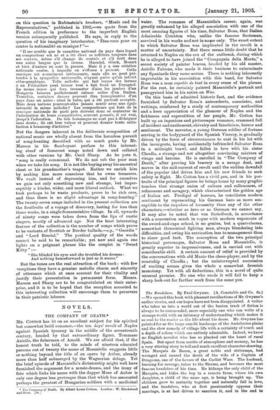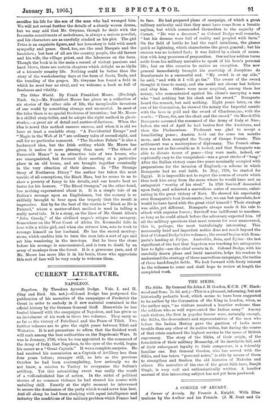The Bandolero. By Paul Gwynne. (A. Constable and Co. 6s.)
—We opened this book with pleasant recollections of Mr. Gwynne's earlier stories, and our hopes have not been disappointed. A writer who takes us into a world out of the beaten track of fiction is always to be commended, more especially one who can write of a strange world with an intimacy of understanding which makes it as real to the reader as the life about his doors. Mr. Gwynne has painted for us tho large sun-lit landscape of the Andalusian plains and the slow comedy of village life with a certainty of touch and a depth of colour which are entirely admirable. Indeed, we know no English novelist who has so plucked out the heart of rural Spain. But apart from merits of atmosphere and scenery, he has a very stirring story to tell and much excellent character-drawing. The Marques de Bazan, a great noble and statesman, had wronged and caused the death of the wife of a Captain of Dragoons, one of the heroes of the Carlist Wars. The husband, burning for revenge, takes to the Sierras, and becomes the most famous bandolero of his time. He kidnaps the only child of the Marques, and hides the boy in a remote farm, where his own daughter, a child of the same age, is being brought up. The children grow to maturity together and naturally fall in love, and the bandolero, who at first passionately opposes their marriage, is at last driven to sanction it, and in the end to sacrifice his life for the son of the man who had wronged him. We will not reveal further the details of a closely woven drama, but we may add that Mr. Gwynne, though he deals with the favourite constituents of melodrama, is always a serious novelist, and his characters are as carefully studied as his plot. The girl Petra is an exquisite figure, and her love-story is told with much sympathy and grace. Good, too, are the mad Marques and the bandolero ; but best of all are the country people, the old farmer and his.wife, the village priest, and the labourers on the farm. Though the book is in the main a record of violent passions and hard blows, there are certain chapters which delight ns as idylls of a leisurely country life. Nothing could be better than the story of the weed-clearing days at the farm of Santa Tecla, and the treading of the grapes. Mr. Gwynne has found a field in which he need fear no rival, and we welcome a book so full of freshness and vitality.







































 Previous page
Previous page